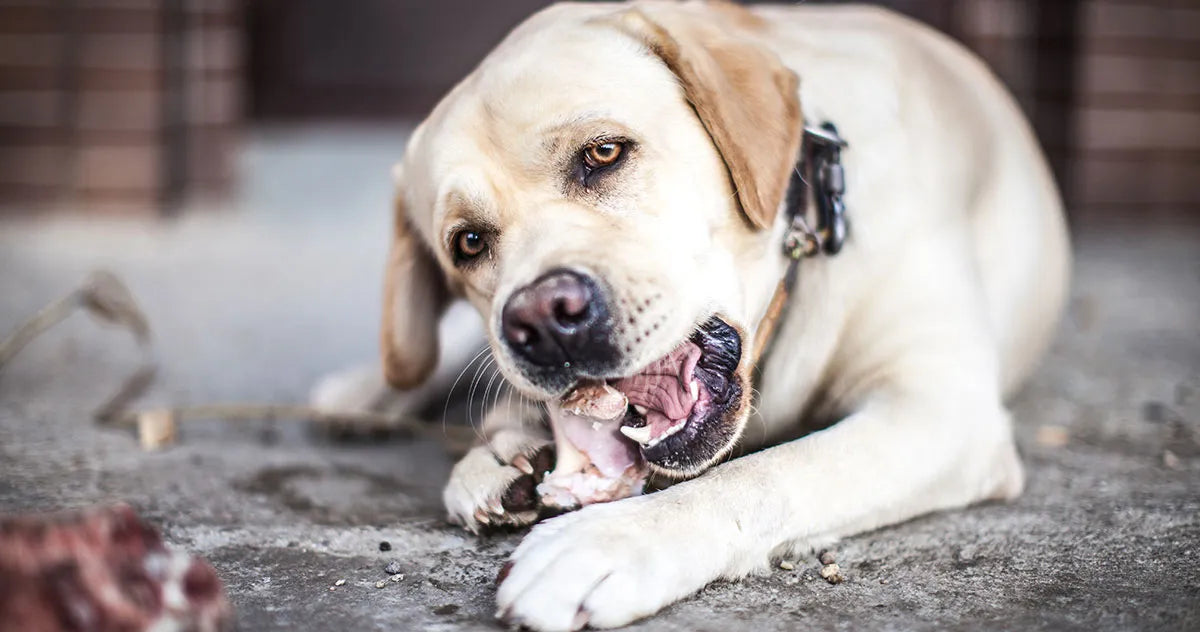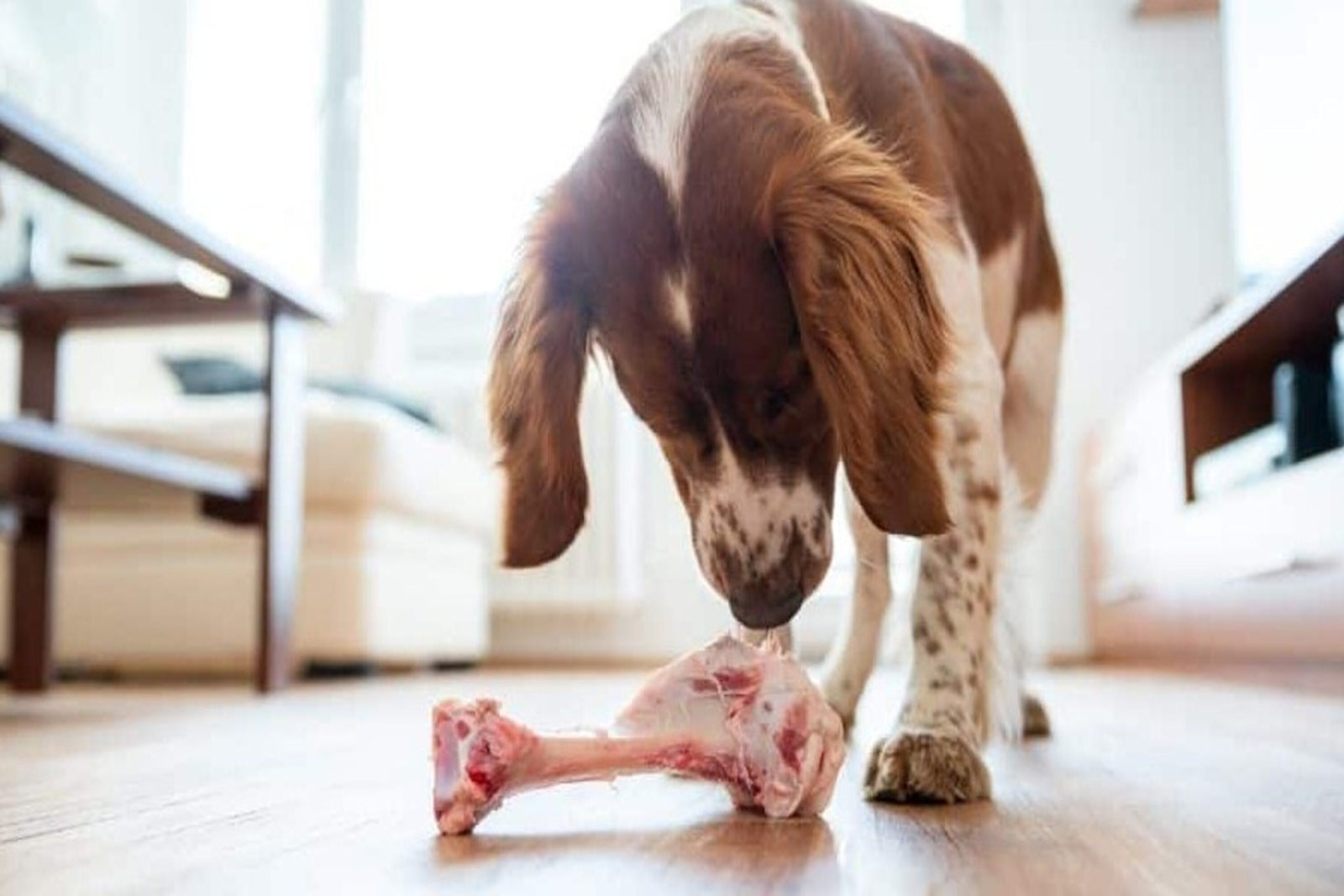Lamb has been gaining popularity in America, in part because it's a delicious and highly nutritious meat that contains many vitamins and minerals. But is lamb meat healthy for our furry friend?
Absolutely, yes! Lamb is a safe and healthy meat that you can feed to your dog. Continue reading to find out its many health benefits and how to share this delicious protein with your dog.
3 Health Benefits of Feeding Lamb to a Dog
Below are 3 reasons why you should include lamb in your dog’s diet.
1. Healthy Source of Protein
Lamb, just like every other meat, is primarily composed of protein. A 100g serving of lamb has around 24g of protein. Plus, it contains all nine essential amino acids making it a high-quality source of protein for your dog that can help build and maintain muscles.
Including lamb meat in your dog’s diet will also help maintain and repair their cells, support the immune system, and promote the growth of hormones and healthy enzymes.
2. Promotes Healthy Skin & Coat
Lamb is a rich source of omega-3 fatty acids. These fatty acids act as an anti-inflammatory and protect your dog against inflammation or damage from free radicals. It helps relieve itchiness, dryness, and skin allergies by supporting the skin and coat health of your dog.
Apart from that, omega-3 fatty acids also have a wide range of health benefits as they help support the dog’s immune system, heart, and kidneys. It’s also highly beneficial if your dog suffers from arthritis or other chronic pain conditions.

3. Contains Many Vitamins & Minerals
Lamb contains many important vitamins and minerals that are required for vital body functions. It’s particularly rich in B vitamins as it contains vitamin B3 (niacin) which helps break down fatty acids to produce energy, vitamin B6 which helps the body form hemoglobin, and vitamin B12 which is crucial for a healthy nervous system.
On the minerals side, lamb provides iron in form of heme iron which is highly bioavailable and better absorbed by the dog’s body. It’s an essential mineral that is directly involved in the formation of red blood cells and hemoglobin.
Lamb is also rich in phosphorous that supports healthy kidney and motor functions. It also contains zinc which is an antioxidant that supports healthy skin and coat and strengths your dog’s immune system.
How to Feed Lamb to a Dog
There are various ways in which you can incorporate this delicious red meat into your dog’s diet. Let's discuss 3 of the most popular ways in which you can feed lamb to your dog at home:
Store-Bought Dog Food
One of the most convenient ways to feed this protein is to buy high-quality dog food that already contains lamb and/or lamb meal.
The main difference between these two ingredients is how they are processed. Lamb on the ingredient label refers to de-boned muscle meat that comes from the animal, similar to what you would find in a grocery store. Lamb meal refers to muscle meat, organ meat, and some bone that has been cooked, dried, and ground. This makes lamb meal a good source of protein and minerals like calcium.
Raw Lamb
Dogs can eat and digest raw lamb although most vets advise against it. This is because it may contain harmful bacteria like Salmonella, Listeria, E.Coli, and more.
Most vets also advise against raw lamb for dogs who have developing or weakened immune systems and dogs who suffer from digestive issues or sensitive stomachs.

Home-Cooked Lamb
Cooked lamb is a safe and healthy option for a dog. But make sure while cooking you don’t add any seasoning to the meat as it can be harmful to your dog’s health.
You can cook ground lamb with rice and some dog-friendly vegetables or boil some meat chunks and add them as a topper to their kibble diet to make it more appetizing.

What Parts of a Lamb are Safe for a Dog?
From bones to liver and heart, let’s discuss what parts of a lamb are safe for a dog:
Can Dogs Eat Lamb Bones?
While some bones are safer to give to your dog than others, it's often recommended to avoid giving raw bones to your dog as it could splinter and there’s also a risk of bacteria.
If you still want to feed a raw bone to your dog, you should only feed them a bone that is bigger than their snout. Also, ensure the bone is clean and free of harmful bacteria. Don't leave the dog unattended with the bone as they can easily choke or hurt themselves.
And what about cooked lamb bones? Cooked bones can break and splinter more easily causing injury to your dog. It can hurt their mouth and tongue or cause serious internal injury by piercing the esophagus or intestine. Thus you should always avoid giving cooked lamb bones to your dog.
If you want your dog to get the most nutrients from the lamb bones, try making a lamb bone broth at home. You can also add vegetables to the recipe to make the broth more nutritious. But don’t add any seasoning or harmful ingredients like onion and garlic to the recipe.
You can feed this bone broth to your dog when they are sick or add it to their regular diet to make it more appetizing.

Can Dogs Eat Lamb Fat?
You should never feed lamb fat that's present on the outside of the cut of meat to your dog. Whenever you are cooking lamb at home, make sure you cut off the skin and exterior fat. It isn’t healthy for their body and can cause diarrhea and might even trigger pancreatitis.
Although the marbling of fat within the piece of lamb is safe for a dog.

Can Dogs Eat Lamb Liver?
Lamb's liver is a safe and healthy option for your dog as it contains a high amount of vitamin A, vitamins B2, B9, B12, copper, and iron. You can chop the liver into small pieces and cook it with lamb meat. Avoid feeding raw liver as it might contain bacteria and parasites.
Also, try feeding lamb liver as an occasional treat as overindulgence can lead to a vitamin A overdose.

Can Dogs Eat Lamb Heart?
Just like the liver, the lamb’s heart is also healthy and full of essential nutrients. You can cook and feed it to your dog as an occasional treat. But avoid feeding too much as the heart is relatively fatty and can lead to an upset stomach.

Some Precautions While Feeding Lamb to Your Dog
Lamb is perfectly safe for a dog but in moderation. Too much of any food, even protein-rich meat, can be harmful to their health. They need a healthy and well-balanced diet that contains protein with other essential vitamins, minerals, and fiber.
It’s also important to know that some cuts of lamb contain more fat than others and eating fatty meat regularly can irritate a dog’s stomach, especially if they’re small or suffer from digestive issues.
Furthermore, when feeding lamb to your dog, you should also be cautious about an allergic reaction. Look for the following signs of an allergic reaction:
- Upset stomach, vomiting, or diarrhea
- Constant itching and licking
- Red or irritated eyes
- Runny nose or continuous sneezing
- Swelling on the face, lips, ears, or eyelids
- Red or inflamed skin
- Itchy ears
If you notice any of these signs of lamb allergy, contact a veterinarian immediately.
Summing Up
Lamb is a delicious and nutritious red meat you can feed to your dog. It’s a high-quality source of protein that contains omega-3 fatty acids and many other essential nutrients. They work together to boost the immune system, promote healthy skin and coat, and support the overall growth and well-being of a dog.
You can easily buy dog food and treats that contain lamb or cook some meat at home. But it’s recommended to avoid feeding raw lamb to your dog as it might contain harmful bacteria like Salmonella, Listeria, E. coli, and more. The same goes for lamb bones as they can also contain bacteria or they can splinter and cause injury to your dog’s mouth and internal organs.
FAQs
Let’s answer some frequently asked questions about feeding lamb to your dog.
1. Can Dogs Eat Raw Lamb?
Many vets advise against feeding raw lamb to a dog. There’s a risk that it might contain harmful bacteria like Salmonella, Listeria, E. coli, and more.
2. Can Dogs Eat Cooked Lamb Bones?
No, you should never feed cooked lamb bones to your dog. It can easily break and splinter causing injury to your dog's mouth or tongue. It can even cause a serious internal injury by piercing the esophagus or intestine.
3. Can Dogs Eat Lamb Shanks?
Yes, your dog can eat lamb shank. It’s a cut from the bottom section of the lamb’s leg. You can buy lamb shanks, cut off the fatty trimmings, cook the meat without any seasoning, and add it to your dog's meal.
4. Can Dogs Eat Lamb Organs?
Yes, your dog can eat lamb organs like liver, kidney, and heart but in small amounts. Also, make sure you only feed cooked lamb organs as the raw ones might contain harmful bacteria.
If you still have any further doubts or questions, contact your veterinarian before adding lamb to your dog’s diet.
Sources:
Join Our Pack
Sign up for our monthly newsletter focused on dog digestion health, cute pup stories, and the latest scoop from Nextrition.
https://www.purepetfood.com/help/can-dogs-eat-lamb
https://addictionpet.com/blog/why-feed-lamb-for-your-dogs-health-benefits-and-more/
https://www.shepherdsongfarm.com/grass-fed-grass-farming/health-benefits-grass-fed/





